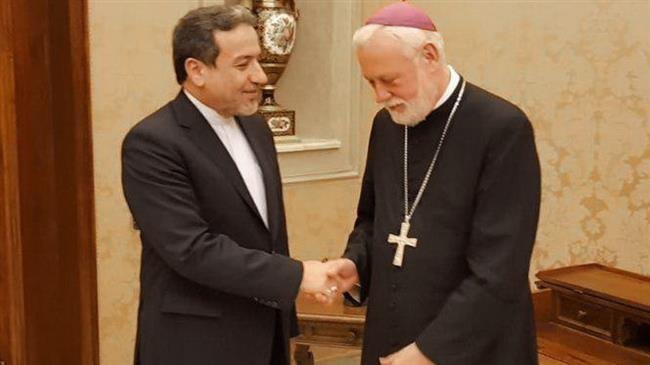EU has so far failed to find practical solutions to save JCPOA: Iran

TEHRAN - Iranian Deputy Foreign Minister Abbas Araqchi said on Friday that the European Union has so far failed to present a practical solution to save the 2015 nuclear deal, officially called the Joint Comprehensive Plan of Action (JCPOA).
“Iran expects the EU to fulfill its economic obligations under the JCPOA,” he told reporters in Rome, Italy.
He noted that Iran has fulfilled its obligations under the JCPOA and expects the Europeans to meet their economic commitments along with the political ones.
Since the nuclear deal went into force the UN nuclear watchdog, the International Atomic Energy Agency, has issued more than 10 reports each time confirming that Iran is fully abiding by the terms of the nuclear agreement.
Under the nuclear agreement signed between Iran, the European Union, Germany and the five permanent members of the UN Security Council in July 201, Tehran agreed to put limits on its nuclear activities in exchange for termination of economic and financial sanctions.
However, U.S. President Donald Trump officially withdrew Washington from the 2015 nuclear deal in May and ordered sanctions on Iran. The first round of sanctions went into force on August 6 and the second round, which targets Iran’s oil exports and banks, were announced on November 4.
Sanctions have endangered nuclear deal
Araqchi said on Thursday that the renewal of U.S. sanctions has “endangered” the nuclear deal.
“The new wave of anti-Iran sanctions by the U.S. puts pressure on underway efforts to implement the commitments existing under the agreement,” Araqchi said in Rome.
“The consequences of the reinstatement of the sanctions on the part of the U.S. are worrisome,” he added, according to Press TV.
The nuclear deal would offer the international community the guarantee that Iran would stay committed to the nuclear Non-Proliferation Treaty (NPT), he told the Vatican’s Foreign Minister Paul Richard Gallagher during his one-day visit to Italy.
“The recent move by Washington can bring along insecurity across the international community as it overshadows international relations and equations,” the Iranian official warned.
He said the other parties to the agreement consider the reimposition of the sanctions to be “a heavy blow” to the NPT.
‘U.S. using dollar as weapon to pressure Europe’
Araqchi also said the United States has turned its currency dollar into a "weapon" and is using it to challenge the sovereignty of European nations.
“Dollar has become a weapon for the United Sates to force its illegitimate demands upon its European partners, practically challenging their national sovereignty," he said during his trip to Italy, Press TV reported.
During a meeting with Vito Rosario Petrocelli, the chairwoman of the Italian Senate's Foreign Committee, Araqchi reminded the Italian official that Iran had already fulfilled its commitments under the JCPOA and it was the European Union’s “direct responsibility” to hold up its end of the bargain.
Sanctions challenge European sovereignty
Araqchi also said before sanctions can be seen as targeting Iran’s economy, they question the sovereignty, security, and credibility of Europe.
Speaking in a meeting with media representatives in Madrid on Friday, Abbas Araqchi stated that the reimposition of sanctions was illegal and against the UN Security Council resolutions and International Court of Justice (ICJ) ruling, according to IRNA.
“Unfortunately, America takes advantage of dollar to impose its demands,” Araqchi said, adding that it seems European companies have followed the U.S. orders more than their local governments.
The JCPOA was a rare achievement of Europe’s foreign policy and the result of many years of negotiations between Iran and global powers, Araqchi underlined.
Pointing to the recent report released by the IAEA verifying Iran’s commitment to the JCPOA for the 13th time, he said, “America’s illogical withdrawal from the nuclear deal will make other countries not trust negotiations, diplomacy or the United Nations Security Council mechanisms.”
“We hope that Europe will be able to manage this situation,” Araqchi said, adding, “We are looking forward to seeing how Europe will defend its sovereignty against Washington’s pressures.”
NA/SP/PA
